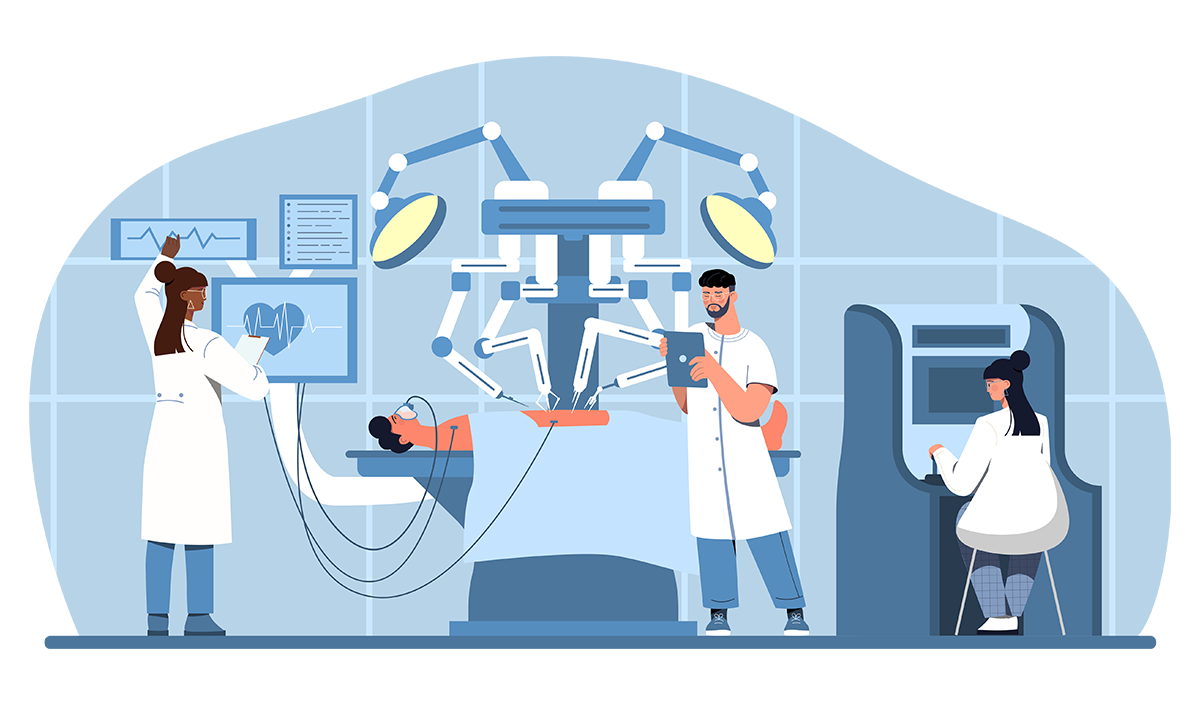This Course Structure is Curated as per the NEP-2020 Guidelines
Course Overview
The B.Sc. Medical Robotics program at Malla Reddy Vishwavidyapeeth, Hyderabad, is an undergraduate course designed to provide students with specialized knowledge and practical expertise in the field of robotics used in healthcare. This program equips students with the technical skills necessary to assist in the development, operation, and maintenance of medical robotic systems used in surgeries, diagnostics, and patient care.
This program focuses on equipping students with the theoretical knowledge and hands- on skills from 1st semester itself. The curriculum covers core topics such as robotic systems in medicine, surgical robotics, automation in healthcare, mechatronics, and the integration of artificial intelligence (AI) in robotics. Students gain experience in working with robotic surgical systems, learning how to operate robotic tools, assist in minimally invasive surgeries, and ensure patient safety during robotic procedures.
Graduates of this program emerge as Skilled Medical Robotics Technologists, ready to support healthcare teams in the operation and maintenance of robotic systems in hospitals, surgical centers, and research institutions. With the growing use of robotics in medicine, this program offers an exciting career pathway for those passionate about combining healthcare and cutting-edge technology. Enabling them to pursue further higher studies & do research in Medical Robotics along with plenty of job opportunities globally.

Course Details
Description: 4 Years Degree Program
No. of Seats: 40
No. of Credits: 160 minimum & as specified
- Eligibility
- Curriculum Structure
- Program Outcomes
- Career Enhancement
- Higher Studies
- Job Roles & Progression
A pass in 10 + 2 with Physics, Chemistry, and Biology/Mathematics as main subjects from a recognized board (CBSE, ISC, or equivalent).
Semester | Name of the Subject |
Semester 1 | Human Anatomy Human Physiology Biochemistry Public Health Concepts National Health Programs & ABDM Introduction to AYUSH English & Communication Skills Computer Foundation Understanding Data Source & Structure Practicals in Human Anatomy Practicals in Physiology Practicals in Biochemistry |
Semester 2 | Microbiology Pathology Occupational Health Languages for Coding Introduction to GitHub Essentials of Research Design & Literature Reviews Essential Biostatistics Digital Health Terminology Regulations and Ethics Practicals in Microbiology Practicals in Pathology Practicals in Coding |
Semester 3 | Advanced Data Analytics (R/SPSS/STATA/SAS) |
Semester 4 | Introduction to Electronics Circuits & Platforms |
Semester 5 | Autonomous Mobile Navigation for robotics Swarm Robotics AR/ VR/ MR for Health care Simulation of Robotics Market Research & Needs Assessment Practicals in AR/ VR/ MR for Health care Practicals in Simulation of Robotics Internship |
Semester 6 | Digital twins for Robotics Robotics for Bedside patient Monitoring Robotics for Emergency and ICU Care Robotics for Home based Healthcare Robotics for occupational well-being Robotics for Elderly care Robotics for Health care Logistics Robotics for Healthcare E-commerce Finance for Healthcare Robotics Settings |
Semester 7 | Digital Transformation of Healthcare Digital Health Project Management Wearable diagnostics Exoskeletons & Humanoid for Health Care Drone & UAVs Sustainability & recycling Cyber Security for Health Research Project Design |
Semester 8 | Research Project |
- Robotic Surgical Systems Operation: Proficiency in operating and maintaining robotic surgical systems, such as the da Vinci system, used in minimally invasive surgeries.
- Surgical Assistance in Robotic Procedures: Skills in assisting surgeons during robotic- assisted surgeries by setting up equipment, managing surgical instruments, and ensuring patient safety.
- Robotic System Calibration and Troubleshooting: Expertise in calibrating robotic systems and troubleshooting technical issues during surgery to ensure seamless operation.
- Medical Robotics in Rehabilitation: Understanding the application of robotics in rehabilitation, including robotic exoskeletons and assistive devices for physical therapy.
- Patient Monitoring and Safety in Robotic Surgery: Knowledge of patient monitoring systems used during robotic surgeries to ensure optimal safety and health throughout the procedure.
- Robotic System Design and Development: Introduction to the design, development, and programming of robotic systems used in medical applications, with a focus on engineering principles and innovations in medical robotics.
- Certification in Robotic Surgery Assistance: Specialized training in assisting with robotic surgeries across various specialties such as urology, gynecology, and orthopedics.
- Robotic System Maintenance Certification: Knowledge of maintaining and servicing robotic surgical systems, including routine checks and emergency troubleshooting.
- Medical Robotics Programming Certification: Focus on programming skills for medical robotics systems, including learning software development and integration for robotic procedures.
- Robotics in Rehabilitation Certification: Training in the use of robotic technology for patient rehabilitation, including the operation of robotic-assisted physical therapy devices.
- Advanced Robotic Surgery Techniques Certification: Specialized skills in advanced robotic surgery techniques used in complex medical procedures.
- M.Sc. in Medical Robotics: Advanced study in the integration of robotics with healthcare, including surgical robotics and rehabilitation technologies.
- M.Sc. in Biomedical Engineering with Robotics Focus: Postgraduate specialization combining biomedical engineering with robotic systems design and application in medicine.
- Ph.D. in Medical Robotics or Robotics Engineering: Research-focused program in the development of new medical robotics technologies and innovations.
- M.B.A. in Healthcare Technology Management: Focus on combining business management skills with knowledge of medical robotics for leadership roles in healthcare institutions.
|
Duration |
Roles and Responsibilities |
Salary Range |
|
0-3 years |
Medical Robotics Technician, Robotic Surgical Assistant, Robotics System Support Specialist |
₹4,00,000 – ₹6,00,000 per annum |
|
3-5 years |
Senior Robotics Technician, Robotic Surgery Specialist, Clinical Robotics Trainer |
₹6,00,000 – ₹9,00,000 per annum |
|
5-10 years |
Medical Robotics Engineer, Robotics System Manager, Robotic Surgery Consultant |
₹9,00,000 – ₹15,00,000 per annum |
|
10+ years |
Director of Medical Robotics, Robotics Program Manager, Chief Robotics Technologist |
₹15,00,000+ per annum |

Fee Structure Per Academic Year
| Tuition Fee | Miscellaneous Fee | Scholarship | ||
| 160000₹ | 10000₹ | Above 90% – 32000₹ | Between 80-90% – 16000 ₹ | Between 70-80% – 8000₹ |
| Tuition Fee | Miscellaneous Fee | Scholarship | |||
| 160000 ₹ | 10000 ₹ | Above 95% – 160000 ₹ | Above 91% – 80000 ₹ | Between 81-90% – 16000 ₹ | Between 71-80% – 8000 ₹ |



